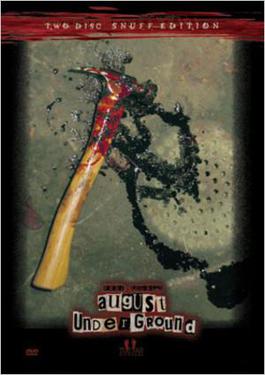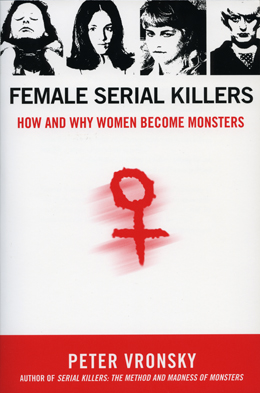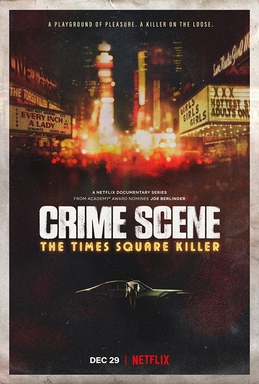A snuff film, snuff movie, or snuff video is a type of film, sometimes defined as being produced for profit or financial gain, that shows, or purports to show, scenes of actual homicide.

A serial killer is a person who murders three or more people, with the killings taking place over a significant period of time in separate events. Their psychological gratification is the motivation for the killings, and many serial murders involve sexual contact with the victims at different points during the murder process. The United States Federal Bureau of Investigation (FBI) states that the motives of serial killers can include anger, thrill-seeking, financial gain, and attention seeking, and killings may be executed as such. The victims tend to have things in common, such as demographic profile, appearance, gender, or race. As a group, serial killers suffer from a variety of personality disorders. Most are often not adjudicated as insane under the law. Although a serial killer is a distinct classification that differs from that of a mass murderer, spree killer, or contract killer, there are overlaps between them.

William Norman McLaren, LL. D. was a Scottish Canadian animator, director and producer known for his work for the National Film Board of Canada (NFB). He was a pioneer in a number of areas of animation and filmmaking, including hand-drawn animation, drawn-on-film animation, visual music, abstract film, pixilation and graphical sound. McLaren was also an artist and printmaker, and explored his interest in dance in his films.
Daniel Richler is a Canadian arts and pop culture broadcaster and writer.

The Battle of Ridgeway was fought in the vicinity of the town of Fort Erie across the Niagara River from Buffalo, New York, near the village of Ridgeway, Canada West, currently Ontario, Canada, on June 2, 1866, between Canadian troops and an irregular army of Irish-American invaders, the Fenians. It was the largest engagement of the Fenian Raids, the first modern industrial-era battle to be fought by Canadians and the first to be fought only by Canadian troops and led exclusively by Canadian officers. The battlefield was designated a National Historic Site of Canada in 1921 and is the last battle fought within the current boundaries of Ontario against a foreign invasion.

Henry: Portrait of a Serial Killer is a 1986 American independent psychological horror film directed and co-written by John McNaughton about the random crime spree of a serial killer who seemingly operates with impunity. It stars Michael Rooker in his film debut as the nomadic killer Henry, Tom Towles as Otis, a prison buddy with whom Henry is living, and Tracy Arnold as Becky, Otis's sister. The characters of Henry and Otis are loosely based on convicted real life serial killers Henry Lee Lucas and Ottis Toole.

David Michael Krueger, best known by his birth name Peter Woodcock, was a Canadian serial killer, child rapist and diagnosed psychopath. He gained notoriety for the murders of three young children in Toronto in the late 1950s, as well as for a murder in 1991 on his first day of unsupervised release from the psychiatric institution in which he had been incarcerated for his earlier crimes.

Joseph Berlinger is an American documentary filmmaker and producer. Particularly focused on true crime documentaries, Berlinger's films and docu-series draw attention to social justice issues in the US and abroad in such films as Brother's Keeper, Paradise Lost: The Child Murders at Robin Hood Hills, Crude, Whitey: United States of America v. James J. Bulger and Intent To Destroy: Death, Denial and Depiction.
Crash 'n' Burn is an experimental film shot in and named after Toronto, Ontario's first punk club by Canadian filmmaker Ross McLaren in 1977. The film, shot on 16mm black-and-white stock, features punk rock performances by The Viletones, Dead Boys, Teenage Head, The Boyfriends, and The Diodes at venues such as; the New Yorker Theater in Toronto and the CBGB and the Times Square Motor Inn in New York City.

Richard Francis Cottingham is an American serial killer who was convicted in New York State of six murders committed between 1972 and 1980 and convicted in New Jersey of twelve murders committed between 1967 and 1978. He was nicknamed by media as the Torso Killer and the Times Square Ripper, since some of the murders he was convicted of included mutilation.

John Borowski is an American independent filmmaker and author. The focus of his work has been on late nineteenth and early twentieth century serial killers, initially in a trilogy of documentaries on American criminals, more recently on particular international criminals, on the commerce that has grown up around such crimes, and on other niche artists.

Pete Boone, Private Eye is an Australian crime comedy television series created and produced by David Murdoch. The show originally aired on Channel 31, before moving to Aurora on Foxtel. It tells the story of Pete Boone, "Australia’s worst detective" who never correctly solves a case. The series is set in a fictional version West Pennant Hills, called "West Pennant Falls". It currently stars Will Seaman as Pete Boone: he is the sixth actor to lead as the titular character. The show has a cult status, and the 1001st televised episode aired on Aurora on 14 December 2014.

Peter Raymont is a Canadian filmmaker and producer and the president of White Pine Pictures, an independent film, television and new media production company based in Toronto. Among his films are Shake Hands with the Devil: The Journey of Romeo Dallaire (2005), A Promise to the Dead: The Exile Journey of Ariel Dorfman (2007), The World Stopped Watching (2003) and The World Is Watching (1988). The 2011 feature documentary West Wind: The Vision of Tom Thomson and 2009's Genius Within: The Inner Life of Glenn Gould were co-directed with Michèle Hozer.

August Underground is a 2001 American exploitation horror film directed by Fred Vogel, who co-wrote it with Allen Peters. The film stars Vogel as a serial killer named Peter, who kidnaps and kills several innocent people, while his unnamed accomplice, played by Peters, films and documents the murders.

Serial Killers: The Method and Madness of Monsters (2004) is a non-fiction true crime history by Peter Vronsky, a criminal justice historian. It surveys the history of serial homicide, its culture, psychopathology, and investigation from the Roman Empire to the early 2000s. The book describes the rise of serial murder from its first early recorded instances in ancient Rome to medieval and Renaissance Europe, and Victorian Britain, and its rise and escalation in the United States and elsewhere in the world, in the postmodern era. The book also surveys a range of theoretical approaches to serial killers interspersed with dozens of detailed case studies of both notorious and lesser known serial murderers, illustrating the theory in practice. Considered by some a definitive history of serial homicide, this was the book serial killer Dennis Rader, the BTK Killer, was reading when he was arrested in 2005.

Female Serial Killers: How and Why Women Become Monsters is a non-fiction true crime history by Peter Vronsky, a criminal justice historian. It surveys the history of female serial killers and female-perpetrated serial homicide and its culture, psychopathology, and investigation from the Roman Empire to the mid 2000s.
Michael Andrew Arntfield is a Canadian academic, author, criminologist, true crime broadcaster and podcaster, a professor at the University of Western Ontario, and a Fulbright scholar. He is also a workplace violence harassment consultant, threat assessor, and former police officer. From 1999 to 2014, Arntfield was employed with the London, Ontario, Police Service as a police officer and detective. In 2014, Arntfield left policing to accept a customized academic appointment at the University of Western Ontario. Today, Arntfield teaches "literary criminology," a term he adopted combined English literature and crime studies program.
Dave Walker was a Canadian writer, filmmaker and photo-journalist who died under mysterious circumstances in 2014 in Cambodia.
Robert Verrall was a Canadian animator, director and film producer who worked for the National Film Board of Canada (NFB) from 1945 to 1987. Over the course of his career, his films garnered a BAFTA Award, prizes at the Cannes Film Festival and Venice Film Festival, and six Academy Award nominations.

Crime Scene: The Times Square Killer is a 2021 American limited docuseries made for Netflix and directed by Joe Berlinger. It is the second installment in the Crime Scene documentary series, following Crime Scene: The Vanishing at the Cecil Hotel. Its story focuses on the series of 1970s-1980s murders that were carried out by American serial killer Richard Cottingham, also known as the Times Square Killer and the Torso Killer. The series was released on December 29, 2021.














